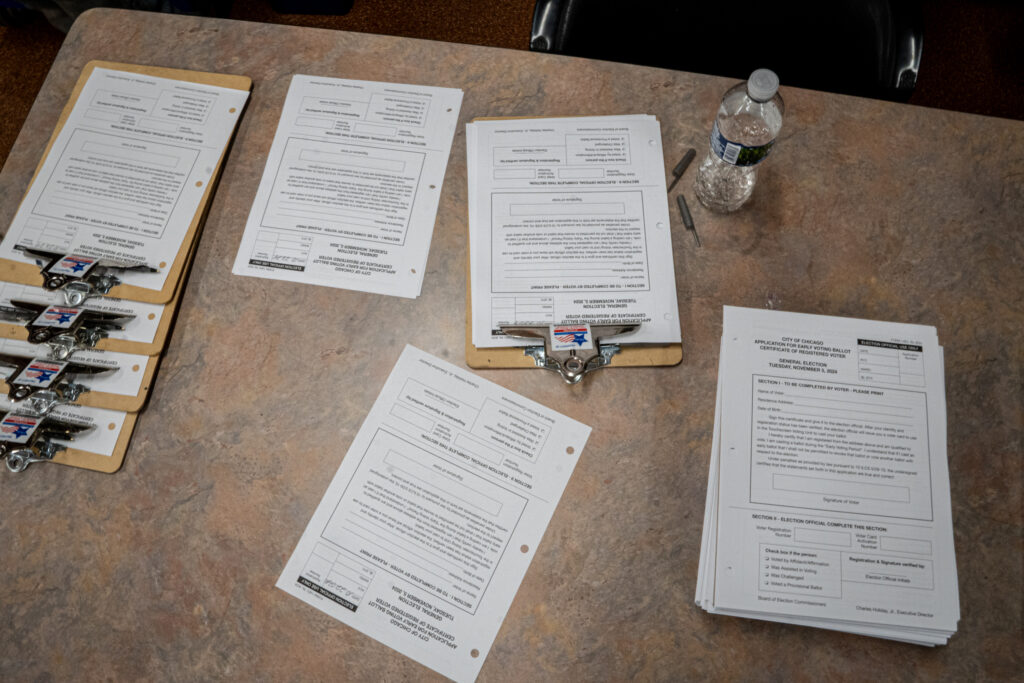By Ava Steffens >>
With a tight presidential race, both major party candidates are trying to pick up voters, particularly among Generation Z, where 8 million young people join the electorate and could cast ballots for the first time on Nov. 5.
These young voters are progressive and tend to lean toward the Democratic Party. The Pew Center for Research found in April 2024 that 66% of voters between 18 and 24 associate with the Democratic Party.
So where does that leave young conservative voters?

On college campuses, even in more conservative communities, it can be particularly hard.
One student at Southern Illinois University Carbondale declined to give her name because she was unsure how her classmates would react. “I would say most of my friends don’t agree with my views and that’s okay,” said the student, who is registered as an independent. “I also have friends who do. I would say opinions are split 50/50.”
A poll conducted by Niche.com, a ranking and review website, found that almost half the students asked (48%) feel that the politics of the campus are pretty balanced. However, a significant group surveyed (27%) said the campus leans more towards being liberal. Very few (3%) report the campus overall being conservative.
College towns have become increasingly more liberal, according to The American Communities Project, which has designated 171 independent cities and counties as “college towns.” Of those 171 places, 38 have flipped from red to blue since the 2000 presidential election. Seven flipped from blue to red.
Jackson County, where SIUC is located, is no exception. According to the official Illinois State Board of Elections 2020 general election polling data, 49.38% of votes in Jackson County were for Joe Biden, and 48.09% were for Donald Trump. While Jackson County might be split in votes, surrounding counties leaned more red in 2020. For example, 67.75% of Williamson County and 74.38% of Randolph County votes were for Trump.
Illinois is a predictably blue state because of Chicago and the suburbs. Central and southern Illinois are more reliably red. This is reflected in SIUC’s student body since those who attend the university come from all over the state, and in some cases, out of state.
Caleb Gentry, a senior at SIUC, described himself as more Republican-leaning. He plans on voting red in the upcoming election. “One of the things that comes up a lot is gun control. Do I think we need some regulation to make people owning guns safer? Of course. Growing up in a family that hunts and has served in the military, I don’t see actual guns as the problem,” Gentry said.
Republican-leaning students told GJR that they’ve received mixed responses from their peers when discussing their political views. A common assumption that the students wanted to debunk was that those with conservative politics were all intolerant of those from marginalized communities, specifically people of color.
Zachary Lochard, who is president of the SIU Chapter of Turning Point USA, an organization whose values lean more towards those of “right-leaning libertarians,” said that he finds that Liberals and Democrats “tend to overuse the word ‘racism’ a lot more than they should.”
If you label everyone on the right as ‘racist,’ then nobody is racist,” he said, adding that he identifies as Hispanic-American and has been called a “race traitor” because of his political views.
Gentry also said there is a commonly pushed narrative of Republicans and Conservatives being overall intolerant of marginalized groups. He said Christians are often blamed. “I try to keep the peace, but I do have to bite my tongue a lot. I feel I would be shunned or attacked for my views in some areas,” Gentry said. “A couple of coworkers were saying that people with my religion were 100% the problem with everything. I get that there are a few bad ones out there, but it’s times like that where I know if I say anything, respectful or not, I’ll be made the bad guy.”
While the students weren’t too positive about what their peers thought about their views, they said that their families did. Some of their opinions are even a result of family experiences.
The students said they had a few specific issues impacting their vote. Across the board, the students seemed passionate about their right to free speech. Lochard noted that free speech was one of the main issues that Turning Point USA advocates. “Most Republicans are about individualism and self-sustainability,” Lochard said.”The First Amendment is the one that allows us to have this conversation and sit down and talk about public universities and such.”
The students expressed that they differ from other Republicans with certain individual beliefs that they hold. Gentry, for example, studies zoology and said he approaches the issue of climate change with a scientific perspective. “I’m glad I can share that with some people who are Democrats. It’s obvious at this point.”
Lochard said a large issue we see in politics today is the division between what defines a Republican versus a Democrat, mostly pushed by the media of both sides. “The divide we see is usually for a spectacle, and people adopt that themselves. It grows into a ‘they vs. them’ argument.”
Ava Steffens is a Southern Illinois University Carbondale senior majoring in communications studies/public relations and minoring in journalism.
- News analysis: Missourians take leading roles in Trump’s ‘weaponization’ of the Justice Department and election denial
- Commentary: Stars and Stripes’ legacy of editorial independence shows value of a free press
- News analysis: Trump’s handling of Minnesota investigations defies time-tested procedures and looks like a ‘cover-up in plain sight’
- St. Louis KDHX-FM radio disappears, but alums stage CRSTL comeback
- Remembrance: During a five-decade career Terry Ganey always got the truth and ‘wouldn’t take no for an answer’
